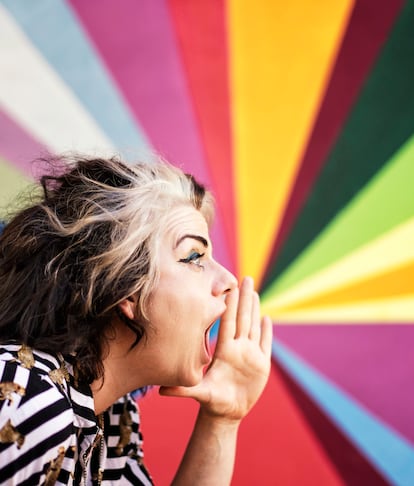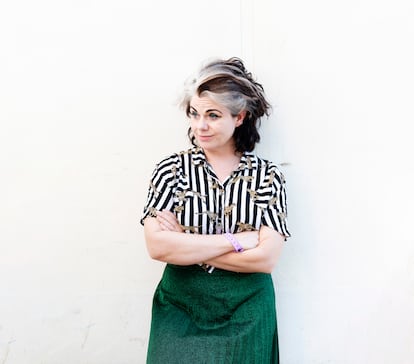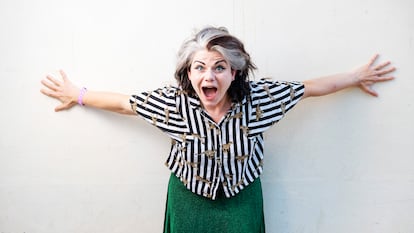Caitlin Moran: ‘Why aren’t any men writing about why they became rapists? That’s what I want to read’
She revolutionized the publishing market with her light and funny feminism in ‘How to Be a Woman’ and ‘How to Build a Girl.’ After writing 360,000 words about the female experience, she’s ready to take on a new literary challenge: what’s wrong with men?

Caitlin Moran came prepared to enjoy the sun and swimming in Spain. “I brought my Balearic Dr. Martens,” she jokes. We’re on the terrace of the Innside by Meliá Calviá Beach hotel, and Moran is showing why she’s changed her classic boots for a pair of summer sandals as she puffs on her electronic cigarette. “Always wear a pair of shoes that you can run away from a bad person in; you need to be able to dance and run away from bad people in your shoes. That’s my primary piece of advice,” she says. Her back is facing an infinity pool and a turquoise-colored cove. It’s October, but it feels like July. The 47-year-old Moran is the eldest of eight children; she and her siblings were raised by hippies in public housing in Wolverhampton, England. She began writing at the age of 11 and got her TV show and column in The Times at 18. Now, she is visiting Mallorca for its Expanded Literature Festival. She is ready to take a dip (“swimming makes me feel sexy, that’s how I learned to love myself and accept my body”). Soon, Moran will present her latest book, More Than a Woman, in which she explores what happens when you become a middle-aged woman and find yourself scheduling a “maintenance fuck” with your husband for Fridays at 8am, as soon as the girls leave for school.
It’s been a decade since Moran revolutionized the publishing market by bringing feminism to thousands of women in a light and fun way while advocating for abortion rights and condemning the tyranny of beauty standards. The effusive and generous writer says that she has come full circle. Currently, she is writing two films, one of which is about a group of mothers who set out to produce feminist porn (which her sister will direct) and another about an opera singer who avenges rapists. “[After adapting How to Build a Girl into a movie], I want to make a movie every year... Really. I [want to] write a book one year [and a] movie the next year. Book, movie. Book, movie…That’s the plan. I’ve sold every book that I can possibly sell to a woman, so now I need to find a new audience.”
Question. It’s been 11 years between publishing How to Be a Woman and your most recent book, More Than a Woman; you’ve now written four books. The world seems different from the one you described in your first book.
Answer. When I wrote How to Be a Woman, I wrote it because no one was talking about feminism. It was just a very academic subject. And people thought that [all] feminists were very angry... lesbians who hated men, and angry lesbians who hate men are brilliant. They’ve got a lot of shit done. Yeah, but feminism… has to be for every woman. So, I wanted to write something that was fun to read so that you would read it and go, Oh, yeah, that’s what feminism is. I am a feminist.
Q. And then everyone became a feminist.
A. After the book came out, feminism changed. Social media helped this, but people started talking about feminism again. [Funny] TV shows like Girls and Fleabag with Phoebe Waller-Bridge and then beyond, say using Chimamanda Ngozi Adichie’s We Should All Be Feminists feminism had this big huge moment. Which is brilliant. But it was mainly about being a young woman. It’s about drinking too much, bad boyfriends, fucking the wrong people, feeling bad about your body…. But that’s all about being a young woman.
Q. How so?
A. When you get older, feminism is very different because it has to be the feminist of being a mother, of being a caregiver for old parents… getting older and working out how I feel about money, politics. When you get older, you can’t be that crazy girl anymore.
Q. Has getting older forced you to be more than a woman?
A. Literally. You have to be doing all these jobs, which you don’t get paid for. And when you get older, you really start to see the difference between men and women. The male writers I know who are my equals, my peers, have very different lives, because every woman I know who is a writer, or famous, or on social media, half of our job is doing feminism for no money. We’re always writing petitions, talking to the government, helping young women. That’s feminism. It’s helping other women.
Q. And men don’t do that?
A. The men I know don’t do that. Yeah, they just have to write...The men don’t help [other] men. So, the next book I’m writing is about men and boys. But that’s what needs to happen; I thought that the men would start helping the younger men. Because they aren’t.
Q. You mention that you asked men on Twitter what disadvantage they felt they had in the world. Your conclusion is that “men don’t have the words to say they’re sad.”
A. There are so many emotions today [inside] people, these big men with the tattoos…. And they get the names of their children and their wives and their friends and their mothers [as tattoos]; men love people so much that they will write their names on their bodies. They feel love so strongly, but they find it very difficult to do love and talk about love, to talk about worrying if they’re a bad father or a bad husband. They’ll write it on their bodies, but they won’t say it.
Q. And what else don’t they talk about?
A. Men haven’t taken anything from women, who’ve had to talk about our emotions, had to talk about being a parent, had to look after old people, had to talk about being scared, how to make our lives bigger. Men don’t talk about making their lives bigger, learning something new. Their lives seem very small.
Q. You condemn the outbreak of misogynistic hatred online. You say that if you upload a photo of your breakfast to Twitter on any given Tuesday, within 10 minutes you’re sure to receive two rape threats in the comments.
A. Well, social media has meant that lazy rapists can threaten you more easily than before. In the old days, rapists had to work hard to rape you, you know, and threaten you. They had to come up to you on the street. Yeah. It was more of a noble tradition. They would have to put some effort in. Now they can just sit at home and just say it… Now, every woman I know gets rape and death threats all the time. One of the reasons that I wanted to write the book for men is I think a lot of men are angry and they think, we talk about women all the time. We never talk about men.
Q. You didn’t think that way before. Otherwise, you wouldn’t have written four books about being a woman.
A. For the first five or six years, I was like, I don’t fucking care. I love us talking about women. It’s about time. But now I think that this is half of the job of feminism…. men are angry; people get angry because they’re scared. Why are men scared that we talk about feminism and women and girls so much? So, I think your job as a feminist, once you have tried to help the women, is to go and try and help the men, because, hopefully, half of the problems that women have are angry men who are scared of women and hate women. If we can make the men less scared and less angry, it makes women’s lives better.

Q. But you say that today a feminist may only be loved on social media for six months to a year.
A. This is the cycle. This is how it works. We have one woman, we love her so much for a year, and she’s a god and she’s perfect. And then suddenly it’s like, no… we must find a new one. We must have another one and another one. And we don’t allow women to just stay around and stay in the game and make their mistakes. Yeah, women have to be perfect, or they’re fucked.
Q. Why do you think that happens?
A. Because we lose all that wisdom [to understand] a woman who’s made mistakes and admits them and says, I’ve changed my mind. [Someone who says] here’s what I’ve learnt is so much more valuable than a new young girl who’s the cool thing that week but just doesn’t know as much because, you know, she’s young. She hasn’t made her mistakes yet. And increasingly, the thing that scares me the most about social media is that young females are scared to make a mistake…
Q. What do they tell you?
A. The young feminists I know just say, I’m so scared that I’ll say something wrong, that I’ll make a mistake.... And that that will make feminism smaller again. Because what I see with young feminists now is they will just retweet. They will copy what other people have said. Yeah, no one wants to ask a question. No one wants to go explain this to me…. You have to know what you think… That’s a very dangerous place to be in the way that we think, in the way that we feel. It’s okay to not have an opinion on something. It’s okay to change your mind like I did. You know, you must be able to say these things.
Q. For example, you’ve written about changing your mind about Botox.
A. It’s very easy to say when you’re 29… oh, I hate Botox. Get to 37, have a bad year, look at your face in the mirror where you just look sad and you’re like, I don’t feel sad. I want to look how I feel inside. And this thing is so quick and so easy compared to, you know, all the other things that you’re allowed to do if you’re a feminist. So, I want you to go. You’re allowed to change your mind. This is a useful thing. It just makes you look like you’ve had a good night’s sleep… And if you got to the age where you haven’t had a good night’s sleep for ten years, use this fucking thing that science has given us. It’s useful.
Q. Have you had it done again?
A. I mean, you can probably tell from my face I just haven’t bothered doing it again because I just wanted to spend the money on shoes and cigarettes. But at some point, if I look at my face again and it looks sad, I will. I’ll go get some Botox.
Q. You praise ordinary sex. You are thankful that it has been normalized through shows like Broad City.
A. I love writing about sex because when I was growing up, the information that I got about sex was from watching TV. I just think women are generally given really bad advice about sex anyway. Now, I meet so many teenage girls who say they never want to have sex.
Q. Why is that?
A. [When I ask them] why, they say, because…I’m scared to be hurt. [Internet pornography makes] it look painful. It looks horrible. Men are horrible to you. Men are slapping you…. The idea that a young woman who’s just becoming a teenager, just starting to feel sexual feelings, wants to have sex, and then she looks at that sex and goes, I have to have a man hate me basically to have sex. It breaks my heart because how have human beings fucked up sex? Every other animal in the world has sex. They don’t fuck themselves up about it. It’s like we’re the cleverest ones… we have the best sex. We can have multiple orgasms and… kinky sex.
Q. You have always advocated for women to pleasure themselves. In the paragraph that opens How a Girl Is Made, the main character says, “I’m 14 years old and I’m masturbating.”
A. Masturbation is where it starts… Like, a girl who knows what she likes and knows how to make herself happy can relax herself; she’s a girl that’s likely to not go completely mad. Even when I have been very depressed or anxious, I’d have a quick wank. You feel 50% better. I think we ought to offer wanking licenses [like drivers’ licenses].
Q. You argue the importance of having female mentors, mirrors in which to be reflected. How do you see the new conservative or extreme-right European policies that are succeeding, from the United Kingdom to Italy, and being led by women?
A. The women who have got power recently with Liz Truss and now Giorgia Meloni in Italy are not feminists. They’re women in a very sexist, patriarchal business, politics, and they’ve got internalized misogyny. And it’s the same in England. We’ve got like the most amount of Black and Asian MPs in the Conservative government we’ve ever had. And most Black and Asian people I know, they have internalized racism. They’re trying to be as white as possible… And it’s the same with the women that I see. These aren’t feminist politicians.
Q. And what would you say to them when they claim that they are?
A. They’re women who’ve had to act like men to get their jobs. I’m not going to criticize those women for saying what the game is and playing it [the interview was conducted before Truss resigned]. I’m not going to criticize Liz Truss even though I think she’s stupid and the worst prime minister we’ve ever had, which is fucking saying something given the donkeys we’ve had in the last ten years. [But] if Liz Truss was a feminist talking about rape and childcare, she wouldn’t have been made the leader of the Conservative Party.

Q. When you started writing for Melody Maker magazine, you were practically the only woman on the editorial staff, but now there are many more. Do you think journalism is better now?
A. One of the things that worries me about young female writers is that they sell their lives; it’s always about bad things in their lives. It’s kind of like, ‘I’m crazy, I drink too much,’ and then they get money for this, and they become successful. But then their careers are difficult because if their lives get better and they go, Oh, I’m not crazy anymore…There isn’t a market for that. No one wants to buy it. And that really worries me.
Q. And you don’t see the same thing with male writers?
A. Men don’t have to sell their lives, their secrets in the way that women do. And I love that we tell our secrets and get paid. But the career progression means that when your life gets better, no one wants to know… Men don’t write those pieces. Guys, tell me, why are you a rapist? Why did you go and see a sex worker? Why can’t you talk about your emotions? That’s what I want to read.
Q. You lived through “Smurfette syndrome” in the music magazines, and very few of them have survived. Do you think the music press has declined because of that?
A. I don’t know what it’s like in other countries, but in the UK the music press died because they only had men reading it and men writing. So now music is dominated by women. Yeah, they missed that audience. That’s why the magazines died, because they were just catering to men. But women and gay men love music. So straight men are like, well, that’s that disco, silly pop, silly rock music. That’s the proper music … And I hate that. Disco and pop is better than rock. Yeah, there are more tunes that, you know, the lyrics, you know, they look brilliant, they dance, they sing funny. But this music is seen as lesser compared to rock music.
Q. And now female artists are dominating the cultural conversation.
A. Yes. So that’s what worries me about it. We’re at the point now where women’s music is more interesting than men’s music. You’ve got people like St Vincent and Janelle Monae. Yeah, you know, no one’s writing those big clever pieces that we used to have about the men. And I hate that because women’s music deserves to be taken seriously.
Q. When did you have the epiphany that you didn’t want to be like male writers anymore?
A. I thought that to be a good writer, I had to please men. And suddenly I realized I could write things that only women read for the rest of my life. And that’s 52% of the population. Also, women read more. Women buy more books. Why are we writing for men when men don’t buy books? I was maybe 30 when I realized that if I just write for women, it wasn’t a failure.
Q. And now men read your books too.
A. Half the readers of [How to Be a Woman] were men. [Initially], my publisher said, ‘Let’s hope women buy this book because no men will buy a book called How to Be a Woman.
Q. Do you think men had to hide to read it?
A. They’d have to cover up the book so that no one would know what they were reading. Yeah, it was like a secret. And that was interesting for men. It was emotional pornography [for men] because they’re like, ‘Oh my God. Now, I know when my girlfriend means when she says, I’ve got nothing to wear’… It was like a manual for understanding women.
Sign up for our weekly newsletter to get more English-language news coverage from EL PAÍS USA Edition
Tu suscripción se está usando en otro dispositivo
¿Quieres añadir otro usuario a tu suscripción?
Si continúas leyendo en este dispositivo, no se podrá leer en el otro.
FlechaTu suscripción se está usando en otro dispositivo y solo puedes acceder a EL PAÍS desde un dispositivo a la vez.
Si quieres compartir tu cuenta, cambia tu suscripción a la modalidad Premium, así podrás añadir otro usuario. Cada uno accederá con su propia cuenta de email, lo que os permitirá personalizar vuestra experiencia en EL PAÍS.
¿Tienes una suscripción de empresa? Accede aquí para contratar más cuentas.
En el caso de no saber quién está usando tu cuenta, te recomendamos cambiar tu contraseña aquí.
Si decides continuar compartiendo tu cuenta, este mensaje se mostrará en tu dispositivo y en el de la otra persona que está usando tu cuenta de forma indefinida, afectando a tu experiencia de lectura. Puedes consultar aquí los términos y condiciones de la suscripción digital.









































